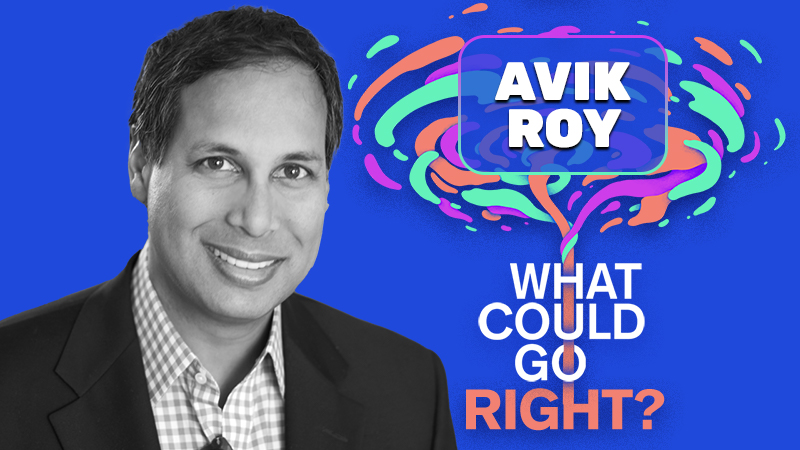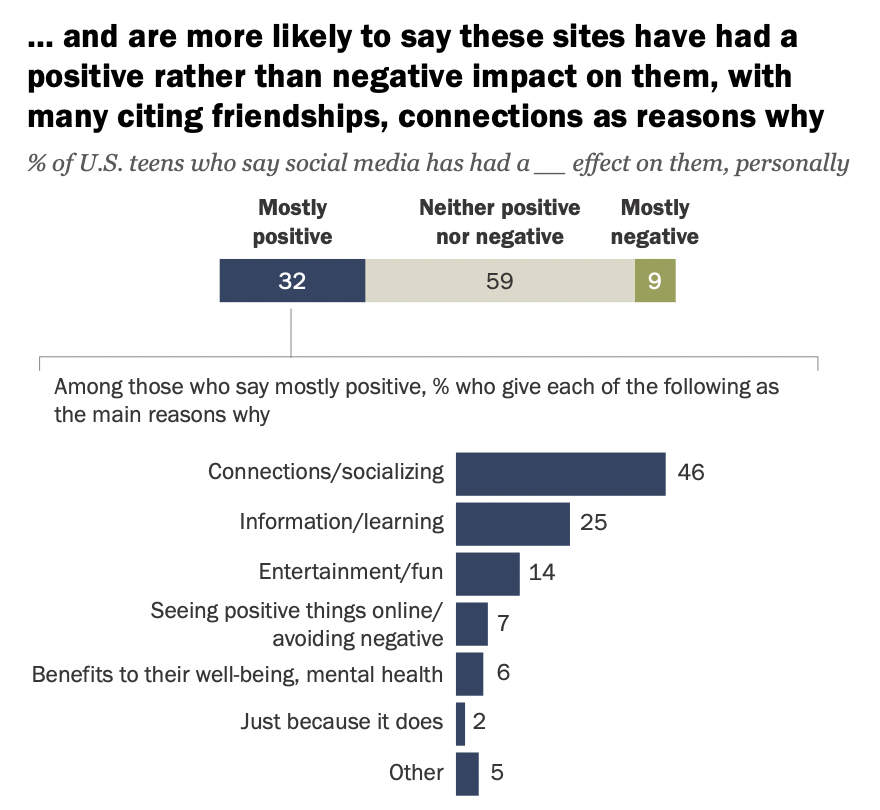Volcanoes are erupting in The Philippines, but on-fire Australia received some welcome rain. The Iran war cries have been called off and The Donald’s military powers are about to be hamstrung by the Senate. Meanwhile, his impeachment trial is starting, and we’re all on Twitter for a front-row seat.
What Could Go Right?: Is social media the loneliness villain we think it is?
Teens have a much more positive view of social media than is often portrayed.
This is our weekly newsletter, What Could Go Right? Sign up here to receive it in your inbox every Thursday at 6am ET. You can read past issues here.
Is social media the loneliness villain we think it is?
There’s a popular thread in the narrative around America’s loneliness epidemic that goes something like this: Americans are lonelier than ever. The proliferation of smartphones and social media is, if not wholly, majorly to blame. Teenagers especially are sitting in their rooms, talking to no one, addicted to their devices and damaging themselves psychologically with every flick of their finger.
This narrative was revisited last week in a Washington Post op-ed by economist Bryce Ward that was then picked up by other journalists. Ward cites data from the Census Bureau’s American Time Use Survey that documented a 2.5-hour decline in time the average American spent with friends between 2014 and 2019, from 6.5 hours per week to 4 hours per week. (I’m leaving aside pandemic-era data as the lockdowns were unprecedented, forced time away from friends.) He goes on to indicate that the data is especially bad for teens, but only references numbers from 2021, which again is fair to assume are skewed.
So, survey literally says: We are spending more time alone, even before the pandemic. What’s not clear to me is how strong the causative link is between that and smartphone use—whether social media is the thing driving us away from social interaction or if it’s the thing that is filling in for it where other, larger societal factors, from urbanization to remote working, have led to more time alone.
To use myself as an example, I’m single, have chosen to live without roommates, and work remotely. Even though I have a healthy social life, my phone is my lifeline for feeling connected throughout the day. When I need a ten-minute work break, I check my notifications. Friends and I send each other voice notes on WhatsApp, swap funny videos and memes on Instagram and TikTok, discuss a years-long dance collaboration on Slack, and catch up on each others’ lives on the video app Marco Polo. Is it the same as meeting up with coworkers at the water cooler? No, but I don’t think it’s demonstrably worse. It might even be better, as I get to see and hear my closest friends throughout the day instead of Kathy from HR. Plus, it’s almost guaranteed I’ll get to laugh at something funny on the Internet.
I share this because it seems closer in experience to what teenagers have to say about the role social media plays in their life than is often portrayed. In new research this month from the Pew Research Center, majorities of teens answering the survey say that social media makes them feel more connected to what’s going on in their friends’ lives as well as more accepted. They view it as a place for them to show their creative side and where there are people who can support them through tough times. Thirty-two percent say that social media has had a positive impact on them—59 percent say its impact is neither positive nor negative—and only 9 percent say its impact has been mostly negative.
We should be concerned about that 9 percent. We should be concerned about rising loneliness, too, as well as concerned with how to mitigate social media’s negative effects, which are more pronounced in older teen girls and are also covered in the Pew research. But right-sizing the issue, understanding social media’s variety of roles for good and for bad, and better taking into account other social trends, would help, not harm, in finding solutions.
When it comes to loneliness in general, this is one problem where individuals can do a lot, and quickly, in their local communities and close circles. Some reads and ideas to get you started: This Vox piece on mental health models in the developing versus the developed world was interesting in its own right and also happened to mention a Zimbabwean nonprofit called Friendship Bench with a lovely concept. Volunteer “grandmothers”—middle-aged or older women—are trained to identify depression and anxiety and to give basic cognitive behavioral therapy. Then they go out, sit on a bench, and talk to anyone who wants to. (New York also has its own version.) There’s a referral program for more severe cases, and more moderate ones are connected to a local, peer-led support group.
And this read from The New York Times on how one Sikh temple in the village of Kakkar in northern India is ameliorating elderly loneliness is sweet and inspirational.
Before we go
Mangrove forests are crucial for carbon storage, but global mangrove cover has been decreasing since the nineties, when we started measuring it. In the last decade, however, loss has slowed down considerably, and almost stopped.
The western African country of Sierra Leone is moving forward on several fronts, including setting aside one-third of parliamentary seats for women and allocating almost a quarter of its entire budget to an educational reform program that will continue to provide free schooling for all Sierra Leonean kids. Put into place in 2018, so far it has led to one million additional children in school.
What was achieved at COP27, the latest climate change conclave? If all new pledges are met—a big if, of course—we would limit warming to 1.7 degrees Celsius, down a degree from last year, which had brought us to a 1.8 degree forecast.
Below in the links section, heat shields for penguins, electricity from snow, a universal flu vaccine, and more.
The fix for crypto, healthcare, and equal opportunity | S3 E10

This week on the What Could Go Right? podcast: What does crypto mean for the future of banking? Why isn’t there an “Uber” for healthcare? Is negative economic growth necessarily bad? Today we’re joined by Avik Roy, President of the Foundation for Research on Equal Opportunity, to explore these questions. Plus, Sierra Leone pushes for change, Congress passes a “Bombshell” bill, and the 8 billionth person is born. | Listen to the episode
Progress, Please
(Found good news? Tweet at us @progressntwrk or email.)
Other good stuff in the news 🐧
Energy & Environment:
- Electricity from snow? A Japanese city believes it can be done | Nikkei Asia
- Wildlife conference boosts protection for sharks and turtles | AP
- New nests help African penguins beat the heat | Hakai Magazine
- Bison spread as Native American tribes reclaim stewardship | AP
- Zero-emission vehicle adoption is accelerating, but a stronger push is needed | CleanTechnica
Science & Tech:
- Electric pulses drastically cut number of sharks caught by accident | New Scientist
- Farmers in the Philippines have harvested genetically modified rice enriched with vitamin A | ETH Zurich
- Inside a DIY tiny home made of carbon-negative cement | Freethink
- Machine learning could translate thoughts to speech in near real-time | Inverse
- A lab-grown-meat startup gets the FDA’s stamp of approval | Wired
Politics & Policy:
- Climate change summit leaves hope for limiting global warming | The Wall Street Journal
- UK to launch new billion-pound home insulation program | Reuters
- London’s ultra low emission zone to cover entire city next year | Bloomberg
- Britain’s online safety bill will criminalize ‘downblousing’ and ‘deepfake’ porn | The Guardian
- A trailblazing approach to marine conservation piloted in Seychelles finds new success in Belize | The Nature Conservancy
Public Health:
- Promising universal flu vaccine could protect against 20 strains | New Scientist
- An unexpected winner in the midterms: public health | The Hill
Society & Culture:
- Americans overwhelmingly say marijuana should be legal for medical or recreational use | Pew Research Center
- Joe Biden has appointed more female and non-white judges than any of his predecessors | The Economist
Economy:
- A hundred UK companies sign up for four-day week with no loss of pay | The Guardian
- The woman disrupting the private wealth industry by helping the rich get poorer | Positive News
- Scotland’s oil and gas workers are finding new work in the wind energy business | The New York Times
TPN Member originals 🧠
(Who are our Members? Get to know them.)
- Why we’re so desperately chasing down happiness | Arthur C. Brooks
- Midterm election results reflect the hodgepodge of US voters | Robert B. Talisse
- What’s your ‘red line’?—a conversation with Mónica Guzmán | Jonathan Haidt
- Danielle Allen on the enduring relevance of the US Constitution | Yascha Mounk
- Learning from disasters: If aviators can do so, why won’t the press? | James Fallows
- How Jay Powell is bending time and upending the business world | Matthew Yglesias
- What happens when you delete all your emails? | Thomas Chatterton Williams
- Democracy as a sacred endeavor—a conversation with Adam Russell Taylor | Eboo Patel
- Buddhism and 84,000 doors | Emma Varvaloucas
Department of Ideas 💡
(A staff recommendation guaranteed to give your brain some food for thought.)
Climate change debate | Lex Fridman Podcast
A conversation between Andrew Revkin, a veteran climate journalist, and Bjørn Lomborg, the author of False Alarm: How Climate Change Panic Costs Us Trillions, Hurts the Poor, and Fails to Fix the Planet.
Why we picked it: I can’t put it any better than science educator Chris Kesler did in this tweet: “The most thought-provoking, kind, and cooperative discussion I’ve heard on the topic. When we lose the mentality that every conversation about hard topics is a win-lose proposition, we can actually find lots of common ground together.” —Brian Leli
Until Next Time
Well done, updated AI—that is one good-looking “otter on a plane using wifi.” 👇



